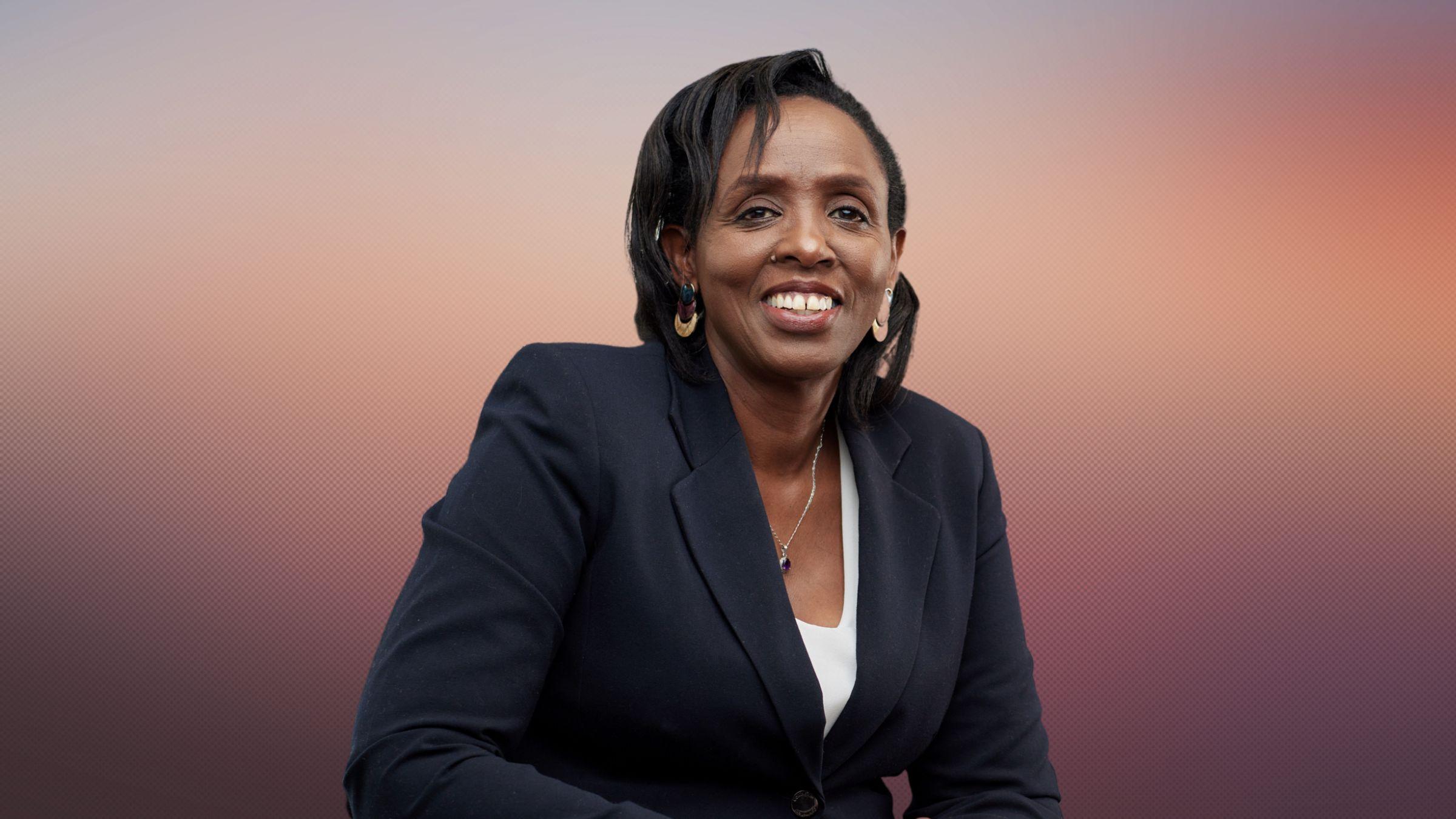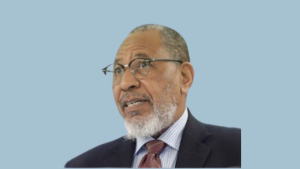Dr. Agnes Kalibata, President of AGRA, on how the Ukraine conflict has been a big wake-up call for many African governments, the huge importance of investing in soils, and her frustration at the slow pace of climate mitigation.
Dr. Kalibata has served as the President of AGRA since 2014, where she leads the organization’s efforts to ensure a food-secure and prosperous Africa through inclusive, sustainable agricultural growth, improving the productivity and livelihoods of millions of smallholder farmers in Africa. From 2019-2021, Dr. Kalibata also served as the Special Envoy of the UN Secretary-General for the 2021 Food Systems Summit, at the start of the Decade of Action to improve food systems around the world to deliver on the Sustainable Development Goals (SDGs) and Paris Agreement. Prior to joining AGRA, Dr. Kalibata was Rwanda’s Minister of Agriculture and Animal Resources (MINAGRI) from 2008 to 2014, where she drove programs that moved her country from a food insecure to food secure status and became a reference point for other countries seeking to deliver agriculture transformation. Dr. Kalibata sits on various boards including the Global Commission on Adaptation, the Global Commission on the Economy and Climate, the Global Panel for Agriculture & Food Systems for Nutrition, the Global Agriculture & Food Security Program (GAFSP), the Malabo-Montpellier Panel, the Global Commission on Climate Overshoot, and the Advisory Committee of the Presidency of COP28. Dr. Kalibata holds a doctorate in Entomology from the University of Massachusetts and has received many awards including the Africa Food Prize, Honorary Doctorates from the University of Liège, and from McGill University. She won the National Academy of Sciences’ Public Welfare Medal in 2019 for her work to drive Africa’s agricultural transformation, and in 2022, she received an Award from World Farmers Organization recognizing her leadership in mobilizing farmers’ contribution to the Food Systems Summit.
As an agricultural scientist, who has been both Minister of Agriculture in your home country of Rwanda, and head of AGRA for nearly ten years, where do you see real examples of more productive and sustainable farming underway across the continent? Can you spell out what seems to be the key factors leading to such success?
There are three broad things to keep in mind when looking at the success of an agricultural system – whether you’re in government or at AGRA. One critical element is access to technology, which is now mainly sufficient in most countries to advance decent production of food, anchored in higher productivity. Globally, we are producing five times more food today than 50 years ago. So there have been huge increases in efficiency over that time, and food has become a big industry. There are two basic elements to technology - improved seed with much better capabilities to give higher yields, and soil nutrition including availability of the right micronutrients in the soil and whether they are available for plants to use. Then, there are a range of other things such as water, and mechanization which help speed things along. But let me say, all this remains largely inaccessible without a functional “public commons” backbone, of which the most important element is extension. I work principally with smallholder farmers. They can’t afford extension on their own, so they need the public commons to provide this. The second public good is a viable market ecosystem, that farmers can plug into. The third one is infrastructure, going from energy to irrigation to roads. These are things that must be provided by the public commons. Outside of technology and a viable public support system, the third part I referred to above is the private sector backbone, which is extremely important. If you have these three things growing in tandem – technology, a public commons backbone, and an effective private sector - you will have an increasingly productive agricultural system.
Now, where has this worked on the continent? It’s in countries where you have strong functional public commons, and in places where they are investing more in the agricultural sector. Just as an example, between 2000 and 2015, we had a good number of African countries investing in agriculture. Starting in 2000, there was a lot of debate and recognition of the need to do things differently. This period was also when AGRA was born. Technology was a critical element of what’s been missing. The Comprehensive African Agricultural Development Programme (CAADP) was signed in 2003, which recognized very clearly the need to invest in public commons, but alongside both CAADP and AGRA, there was a clear recognition of the private sector as the backbone of the agri-food sector. The question of how well countries performed has been very mixed in that period, catalyzed partly by the food crisis of 2008, but three countries stick out in my mind. Rwanda, Ethiopia, and Nigeria put an increasing share of their state spending into agriculture in line with the pledge made through CAADP. This had an impact on food security, economic growth, and most of all, the poverty numbers. Take Rwanda for instance, where 12% of the population moved upwards leaving poverty behind. It’s no surprise, if you have 80% of the population involved in agriculture - it goes without saying that supporting farmers gain access to improved seeds and appropriate fertilizers, alongside extension and markets, had a direct correlation to farmers thriving. Farmers increased yields from less than half a metric ton to 3 or 4 metric tons of maize per hectare. Similarly, today in Ethiopia, they have decided to double down on wheat, due to the Ukraine crisis. This has led to $800mn of savings in foreign exchange, since they no longer need to buy so much wheat from abroad. In the end, success is attributable to a public commitment to spend in the agricultural sector and create an enabling environment for the private sector. It’s a double-pronged approach.
Is the crisis associated with the Ukraine conflict an opportunity to rethink strategy? Might it have the longer-term benefit of demonstrating the vulnerability of agri-food systems for certain African countries that have been forced to give agriculture much greater political attention and associated investment?
There is no question that the Russia-Ukraine conflict was a big wake-up call. Africa has not had so many hungry people and the cost-of-living crisis is impacting everyone. Unfortunately, this Russia-Ukraine crisis cannot be looked at in isolation from the climate crisis. The rise in prices is both a result of the war but also climate change, because food supplies have fallen and of course become so much more expensive- drought is becoming more frequent, the rains less predictable, and yields have been steadily going down. The latest IPCC report estimates a 34% loss of yields in Africa since 1961. We are hugely exposed because of being on the equator. Yes, both the Russian war on Ukraine and COVID-19 left Africa hugely exposed. How many people really knew that the wheat we had in our homes came from Russia or Ukraine? What the combined impact of COVID-19 and Russia-Ukraine did was expose the weaknesses of global supply chains and our dependencies. Many of the value chains and trade systems on which we have relied have been thrown into question. But every dark cloud has a silver lining and Africa is waking up to its potential and the need to produce more food as a result of these crises.
Currently, Africa imports $50bn of food each year, but this is food it could produce locally. I gave you the example of Ethiopia whereby increasing the area under wheat, in the last two years, Ethiopia has been able to cut its wheat imports by $800mn. African countries have largely treated the agriculture sector as subsistence-based, missing its huge economic and great business future. The sector currently generates revenues of $300bn but this could easily triple to become a trillion-dollar industry if we designed it right. For me, the silver lining is that we finally recognize the business opportunity of Africa’s food and agriculture sector. Of the $50 billion I referred to earlier, $18 billion is spent by sub-Saharan Africa to buy four crops that it can produce itself. To do this, we need stronger systems and to build resilience into these systems to reduce our exposure to every shock that comes along. When there is a global shock, we’re all shaken out. Look at the Russia-Ukraine crisis – we were all shaken out, including food value chains. We have largely stayed afloat because of the continent’s inherent resilient capacity anchored in a huge diversity of crops, and production systems.
The African Continental Free Trade Area does give us something to build on to increase trade within the continent – Africa right now depends on something like 17% of internal trade as compared with more than 70% elsewhere. So you can see Africa is a long way behind. We need to catch up and get to 50-60% of intra-African trade. We can do this. Most of this food can be produced here. The Russia-Ukraine war and COVID crisis have been a wake-up call to help us understand how our dependencies on food can be easily disrupted, but our hands are not tied - we can do something about it! Like the rest of the world, this is an opportunity to make farming highly productive. Let’s wake up to the fact that investing in securing food is in our interest, it is good business, and it is critical to strengthen the resilience of our systems. Politically, leaders are now waking up to this. Unfortunately, all our countries are struggling with debt, so to be able to save $800mn as Ethiopia did, is hugely valuable. Many other countries should follow Ethiopia’s lead.
Soils are clearly fundamental to building a sustainable agri-food system, yet they need long-term investment to build up their fertility and structure. How important is land tenure in providing incentives for investment in soils?
Soil is very easy to destroy, especially in some of our environments where we get torrential rain, in tropical equatorial areas- carbon and micronutrients are washed away with topsoil. Our farming practices do not help - the use of a hoe means that only the top 8cms are constantly being farmed creating a thin dust layer that gets washed away during torrential rains and strong winds. This contrasts with deep plowing which helps with water retention and holding capacity. So it is no wonder that farming systems in Africa are losing soils and associated carbon faster than we’re building them. But rebuilding carbon in soils costs money and time. There is a trade-off especially when you see the fragmentation of land in areas where so many of our farmers live. Choices become easier when tenure is clear. I have personally seen a lot of farmers doing their best to keep soils protected from erosion in hilly areas. They know it’s crucial and they even go to the bank and use their own money to invest in controlling erosion if they have secure land tenure. In Rwanda, farmers will go and borrow money and build bench terraces because they know it’s tremendously important to keep soil on their land.
But there is something else that you observe across the continent; farmers who don’t have secure land tenure aren’t prepared to invest in the soil. In many places, there is a loose land market, by which farmers will allow others to use their land for a single crop. The farmer who comes in is just looking for what the land will give them. They don’t invest in strengthening the ability of that land to give a good harvest in the long term but will take whatever the land can offer today. I once asked a farmer why she would use a good variety of seed but she was not prepared to use fertilizers, and she said, “This is borrowed land, so I can’t use fertilizers - they stay in the soil for three seasons and I am only allowed to use this land for one season.” For her, putting fertilizers into the soil is an investment. Secondly, even though she knows the soil needs carbon to help build water-holding capacity, she won’t mulch the crop, and when she does till the land she knows she is creating opportunities for erosion, but it is not her land! You definitely see better practices with farmers who have secure tenure over their land. They also start thinking about what the land means for the future of their families. They tell you “I have planted this forest – my children will use it for this and that.” You don’t hear this from farmers who don’t have tenure, so it is really very crucial.
There is an important land market emerging; and my worry is that if we don’t do it right, this land market will lead to increased degradation. Land markets need to be secured by law, with clear guard rails around the use of land by the renter. I should be able to rent out my land to someone to use it under certain conditions for a certain number of years, for certain crops, without fear of it being degraded. Policies and laws could work to discourage land degradation, but they would have to be based on secure land tenure. China has introduced this sort of land market. So there are important opportunities for governments to be more intentional around land markets, including how public land can be made available for use, how to protect it, and the role of land tenure in achieving this protection.
The regular Africa-Europe Agricultural Ministerial meeting takes place at the end of June. Does Europe have a particular role to play in support for Africa’s agricultural sector, or do you think African countries should look elsewhere for technical and financial support?
My belief is the partnership between Africa and Europe goes well beyond technical and financial support and must include trade. It would be great to see Europe become a better trading partner to Africa and Africa become a more important trading partner for Europe. Africa has always offered a big marketplace for Europe but the reverse is also possible. Europe could become a bigger market for Africa as well. Why should Europe have major trading relations with every other part of the world and treat Africa like a minority partner? 65% of Africans earn their livelihood from agriculture, so negotiating a way to enhance trade in agricultural goods would be a much better payoff than any amount of aid to Africa.
I can tell you from my time as a Minister, it is a nightmare to get the permits needed to trade with an EU country, on any commodity. Once you get it, that’s great, but since it can be revoked overnight, you risk that the crop dies in the field. It has happened many times for commodities like French beans or peppers grown here in Kenya. We want the EU to be a predictable trade partner, and for Africa to be treated equally, which could then result in a much stronger partnership. Instead of which Africa is seen by Europe as an object of charity. What Africa really needs is to learn from Europe how it was able to build a successful trade bloc. With a fully functional continental trade area, the AU will not need to request to be recognized, it will rather be a force to reckon with. Actually, we don’t need any charity from the EU.
My hope is that both sides get off the high horses and ask what would constitute a decent relationship. More than ever, Africa needs now to harness every opportunity, Africa needs the EU to be a better partner. But the EU and other developed countries continue to refuse to come through on Adaptation funding despite the large number of people suffering from climate change impacts. This is one area where a good partnership would benefit us all. Instead, you see the EU push Africa on environmental issues in ways that fail to recognize that Africa is Europe’s nearest biggest carbon sink. It would be really good to see a balanced conversation. If nothing else, let’s make trade work! Africa’s farmers should be given a chance to participate in the EU market, this would impact poverty and create millions of jobs. The Europe-Africa relationship has to be built around more equity and justice – with less of a senior-junior arrangement. Africa is not just a market for others. Once in a meeting, we were talking about trade, and I asked, “So what can we sell to you in Europe?” and the room went silent. EU and AU need to talk about equal and opposite trade based on comparative advantage.
You took on the role of Special Envoy for the UN Food System Summit two years ago, and you’re now coming up to the stocktake of progress at the end of July. What do you want to see from this, and how might it help feed into COP28?
The UNFSS was a great moment to mobilize and wake up the world to many of our challenges. The sector generates 30% of our emissions. And of course, all these emissions are part of the global total which makes it very difficult for people in my part of the world to produce food and thus they face increasing hunger. We must address Food System challenges like everything else, and wake up to the fact this sector needs to be managed to reduce emissions. A lot needs to happen in more industrial countries, which have not gone fast enough to mitigate emissions in food systems. In my part of the world, I want to see more people embrace adaptation and the associated opportunities. I want to see more local food system solutions that ensure that producers, indigenous peoples, and others are able to survive climate change and are building coping and resilience capabilities as a result of local food systems’ transformation. Lastly, I want to see us achieve some big wins for the 2030 agenda as a result of embracing food systems transformation.
What do I want to see from the Stocktake? Having a few countries step forward and be able to show significant improvements, such as strengthening resilience in food systems, with governments staying the course in transforming their systems. Hundreds of solutions were profiled in our preparations for the UNFSS. I hope that many of these have been embraced and are being implemented. A few areas have made real progress including school feeding through local procurement. This creates markets for local farmers while improving children’s nutrition. In Kenya we see far more people rebuilding soil carbon, and regenerating landscapes. I am most proud of the work done by my team at AGRA alongside NEPAD to embed food systems tracking into our continental frameworks, of CAADP and Malabo, in line with the African common position. We are working with a number of countries to design food system transformation strategies that can be showcased at the Stocktake and through to COP28. Often people say they don’t know what to do - I am hoping the work we are doing with a few countries that are taking leadership of this agenda can provide good examples of what needs to happen.
For COP28, we’ve been building momentum, especially outside the negotiations, recognizing that food systems must be part of the COP28 process. For me, we should focus on both mitigation within food systems, and remind other countries that the lack of sufficient mitigation has created a need for much more adaptation. Then there is also the question of Loss & Damage. These are complex and interrelated issues. The problem with our world is that if you don’t address a particular problem in good time, you end up with something more complex and difficult to resolve. It is much better to act early.
A clear dichotomy is often drawn between an approach to agricultural development that focuses on high external inputs, reliant on chemical fertilizer, pesticides, and hybrid seeds, and an agro-ecological approach that privileges recycling of organic matter, local seed varieties, and food sovereignty. Is this a false dichotomy? Can the two approaches be mixed and matched depending on context and geography?
This question is about what production systems work best for Africa, and what might work best for other parts of the world. It’s all about context. Within Africa, there is great diversity - there are places where it is easy to produce with minimal inputs. I live in Kenya which has some areas with deep volcanic soils, so it’s much easier to get a good crop with minimal inputs. AGRA was created in recognition that African farmers do not have access to many of the technologies available to farmers in the rest of the world. It was also in recognition that there was no simple technology fix – rather, Africa needed an institution with the capacity to work with and navigate through a succession of challenges, that it could resolve on the go. We started out thinking that providing access to hybrid seeds with good yields would be half the solution. And it did solve problems from high susceptibility to pests and diseases - just try to grow a local bean crop or local groundnut crop in the rainy season, they cannot cope with the disease pressure. AGRA funded conventional breeding by local institutions to strengthen the ability of crops to deal with some of these challenges and to reduce their susceptibility to pests and diseases. This is not “rocket science” which needs large amounts of biotech. Nowhere else in the world are farmers using traditional landraces with low yields, so why would we expect that in Africa?
On fertilizers, Africa has some of the most highly degraded soils, which have suffered from torrential rains long before climate change, which have had an impact on the soil’s structure and fertility. Chemical fertilizers introduce essential plant nutrients into the soil. Here in Africa, we are only using an average of 14kg/ha which is nothing compared to what is needed or to what Europe is using at 300kg/ha. And remember, Europe and other industrial agricultural countries have been using these levels for the last 50 years or more. Today, if a country in Europe wants to do agroecology, it makes sense. Every season of applying these nutrients to the soil has built a big and deep bank of nutrients from which one can afford to drive an organic system for some years. Organic farming mostly introduces carbon to the soil but doesn’t provide the other nutrients that are critical and often missing in African soils. So, it is wrong for people to say Africa should not use mineral fertilizers. Of course, we are concerned about the impact of mineral fertilizers on the environment, that is why we care about the level of nutrients needed in our soils in order to feed people. At no point at AGRA have we recommended that African farmers use 300kg/ha like industrial countries. We must use fertilizers appropriate to soil needs, and apply them more carefully than we have done in the past, such as through micro-dosing, to stretch farmers’ resources as far as possible, given their limited resources.
If we were to rely entirely on organic agriculture, we’d need 5 tons of organic matter to produce one ton of maize, for example, rather than 25kg of mineral fertilizer. But you must ask – where do these 5 tons of organic material come from? You’ll be eating into your biodiversity reserves to get the organic matter needed to produce the crop. Farmers in Kenya that have not had rain have nothing to make compost with! What is the dichotomy here for these farmers?
We will not go for 300kg/ha of mineral fertilizer. But neither does Europe need 300kg/ha. Africa has a recommendation of 50kg/ha and is still below half of this level. This undermines the continent’s production capacity and fosters environmental degradation. Alongside appropriate use of fertilizers, Africa needs to find ways of rebuilding its soils. What nobody can do is suggest that organic agriculture can feed Africa. We are committed to rebuilding our degraded agricultural ecosystems – we owe it to ourselves. And maybe that way we can influence rainfall patterns, water holding capacity, and ground-water levels and mitigate that drought that is coming at us. There are 101 reasons why we should be doing the right thing – for hunger, health, soils. This idea of a dichotomy is not needed. From a mitigation perspective, we are also saying to those with industrial agricultural systems – put a brake on it! You are contributing to further climate change. Let’s create a better balance between producing food for people and sustaining our environment.
Let me end by saying AGRA has moved from a focus on Green Revolution to a much broader approach to support sustainable Food Systems. We’ll be holding the annual Conference on African Food Systems (former AGRF) in Tanzania in September. We’re also re-naming AGRA to recognize that the green revolution was yesterday. Looking forward, we must transform our food systems, for people’s food, health, and the environment. And we must support heads of state to meet the commitments they have made. It’s an exciting time!








